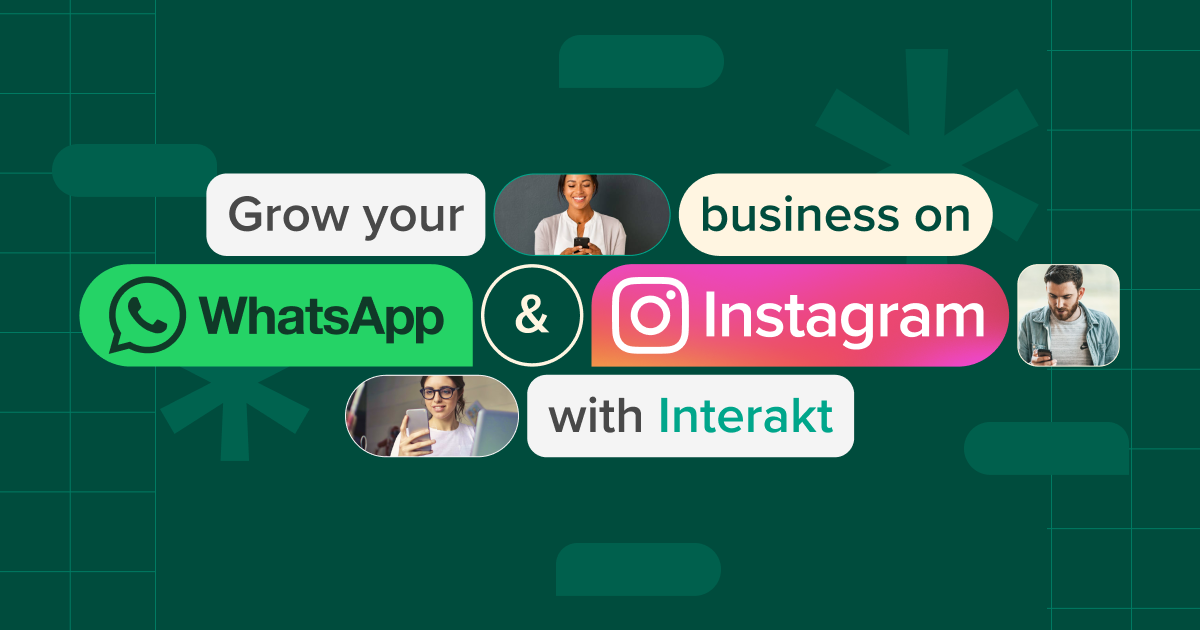Since WhatsApp’s rise to popularity as a powerful business communication platform, B2B companies have also started leveraging WhatsApp extensively for customer communication. From benefits to key use cases, in this post, we will be looking at the immense potential of WhatsApp Business API for B2B companies.
Understanding WhatsApp API in the B2B context
Before we go on to look at WhatsApp API’s major benefits in the B2B sector, let us try to understand why B2B companies are considering this shift:
Instant and direct communication
WhatsApp’s popularity and its direct nature allow B2B businesses to interact with and engage leads, customers, and vendors seamlessly in real time on a channel that is familiar and conversational. The personal quality that comes with the channel also ensures that the communication is more meaningful and two-way, compared to channels like email or SMS.
Automated messaging and chatbots
With the WhatsApp API, businesses can automate messages, employ AI-driven chatbots, or set up auto-replies to streamline B2B sales and support interactions. Automation also allows B2B companies to eliminate the additional expenses of expanding the team when scaling.
Higher engagements and open rates
Unlike channels like email and SMS, WhatsApp has a higher open rate of 98% and a click-through rate of around 45-60%. This makes WhatsApp API a much more viable and practical option for B2B companies to engage clients.
Seamless CRM integration
WhatsApp API enables seamless integration with CRM tools like Zoho or HubSpot, which can enable B2B businesses to have a centralized overview of customer interactions, manage leads, and use customer data for creating personalized customer experiences.
Secure and compliant messaging
WhatsApp’s end-to-end encryption, the business verification process, and measures like pre-approval for message templates, ensure that all communication is secure and trustable. Additionally, the strict data and privacy policies of WhatsApp ensure the safe and ethical use of client data.
Multi-agent support
B2B businesses that aim to scale and expand their customer support can leverage the multi-agent support feature that WhatsApp API enables, to seamlessly allow teams to handle higher volumes of queries without requiring any additional WhatsApp number.
Rich media and interactive features
WhatsApp API can enable B2B businesses to make the experience much more immersive and interactive through the use of rich media like images, PDFs, videos, etc. as well as features like interactive buttons, catalogs, carousels, and more.
Improved customer experience
B2B companies also can use WhatsApp API to improve customer support and enhance engagement. This can be done by providing quicker query resolution, proactive alerts and notifications, and personalized messages.
Key benefits of WhatsApp API for B2B companies
These are the major benefits of using the WhatsApp API for B2B companies:
Enhanced customer engagement
With WhatsApp API, B2B companies can build stronger customer relationships through personalized, two-way conversations in real time. Features like interactive messaging, rich media support, automated responses, etc. allow businesses to respond quicker, create a trust-driven communication experience, and keep their clients engaged.
Streamlined operations
By automating responses to routine queries, appointment scheduling, order confirmations, follow-ups, etc., companies can reduce manual workload. Additionally, with integration with ERP and CRM systems, businesses can centralize communication, set up automated workflows, and optimize resource allocation, thus leading to efficient operations and cost savings.
Improved lead management
In the B2B sector, lead nurturing requires continuous engagement. WhatsApp API can help with this by enabling automated lead capture, qualification, and follow-ups. With CRM tools, businesses can even track conversations, segment leads, and share targeted messages to ensure that all potential clients.
Customer support and service
Businesses can use WhatsApp API to deploy chatbot automation, leverage multi-agent support, and provide instant responses, letting businesses resolve queries quickly. WhatsApp API also can enable businesses to offer proactive assistance and post-sale support, thus boosting retention and customer satisfaction.
Marketing and promotions
WhatsApp API helps make B2B marketing much more impactful as it allows businesses to share personalized promotional messages, product updates, exclusive offers, etc. directly to clients. WhatsApp also can drive better responses meaning that a well-designed promotional campaign can easily show positive results.
Internal team communication
WhatsApp API can help B2B companies streamline their internal communications as well, with automated meeting reminders, task updates, approval workflows, etc. This ensures smoother team collaboration without requiring different platforms.
Event invitations and reminders
B2B companies often conduct events like webinars, product launches, and networking events. With WhatsApp API, these businesses can send automated invitations, registration confirmations, reminders, etc. to simplify event management.
Best practices for implementing WhatsApp API in B2B
Here are some of the proven best practices for implementing WhatsApp API in B2B:
Choose the right WhatsApp API provider
Select a reliable and feature-rich WhatsApp Business API Solution provider to ensure smooth setup and robust support. A good solution will have features like CRM integration, chatbots, multi-agent support, deep analytics, etc.
Ensure compliance with WhatsApp’s policies
As a rule, strictly follow WhatsApp’s messaging guidelines when sharing B2B business messages. Obtain explicit opt-ins and use pre-approved message templates to avoid being flagged as spam, thus maintaining professionalism and trust.
Integrate WhatsApp API with your CRM and business tools
Businesses can have a more unified communication ecosystem by integrating the WhatsApp API with CRM, ERP, and other business tools. This will help in automating lead management, syncing customer data, and personalizing client interactions more effectively.
Automate workflows with chatbots and templates
You can leverage AI-powered chatbots to handle routine queries and automate the qualification of leads. WhatsApp’s message templates can be used to share quick responses, transactional messages, follow-ups, etc. in a consistent and timely manner.
Use rich media
Leverage images, videos, PDFs, and product catalogs to create an informative and engaging communication experience. Interactive buttons and carousels can also be employed to make the customer experience dynamic and appealing.
Segment and personalize
You can segment your customers by industry, behaviors, sales stage, etc. to deliver tailored messages that address their specific needs. This can have a great impact by improving engagement and increasing conversion rates.
Set up multi-agent support
Using the multi-agent functionality will allow multiple team members to handle customer queries simultaneously through a single WhatsApp number. This setup can help your business manage higher volumes of queries without having to compromise speed or quality.
Optimize response time with automation and live chat
You can combine automated replies for routine common queries with live chat for complex issues, creating a more seamless and responsive experience. This also significantly saves time and streamlines the customer support process.
Leverage analytics to track performance
Good solutions come with good analytics features. Use this to track key metrics such as open rates, response times, engagement, conversions, etc. It is also highly advised that you regularly review data and refine your messaging strategies accordingly for success.
Maintain a balance between automation and human interaction
While automation can streamline the majority of communication and enhance efficiency, it is also crucial to know when human support is needed. High-stake conversations, negotiations, complex issue resolution, etc. might require human support agents, to handle it in the best way, ensuring trust and a positive customer experience.
Conclusion
WhatsApp’s potential for B2B is immense, to say the least. From the flexibility and features it offers to the channel’s swift and direct nature; WhatsApp can be a game-changer. But to realize this potential, smart automation is crucial.
This is where a solution like Interakt can back you up.




